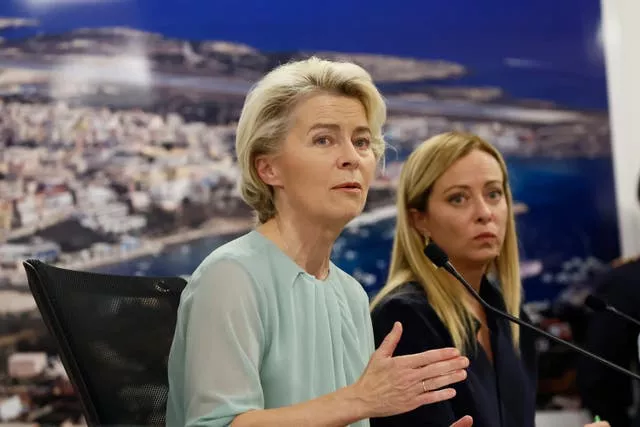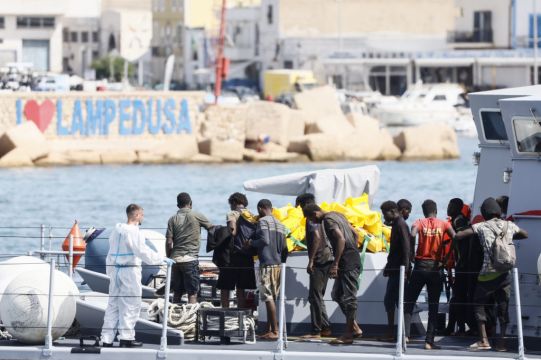The Italian government approved new measures to crack down on migration on Monday, after the southern island of Lampedusa was again overwhelmed by a wave of arrivals from Tunisia.
It came as the migration issue returned to centre stage in Europe with talk of a naval blockade.
The measures approved by the Italian Cabinet focused on migrants who do not qualify for asylum and are set to be repatriated to their home countries.
The government extended the amount of time such people can be detained to the EU maximum of 18 months. It also plans to increase the number of detention centres to hold them, since capacity has always been insufficient and many of those scheduled to be returned home manage to head further north.

Premier Giorgia Meloni announced the “extraordinary measures” after Lampedusa, which is closer to Tunisia in North Africa than the Italian mainland, was overwhelmed last week by nearly 7,000 migrants in a day, more than the island’s resident population.
Italy has been offloading them slowly by ferry to Sicily and other ports, but the arrivals once again stoked tensions on the island and in political corridors, especially ahead of European Parliament elections next year.
Ms Meloni resurrected campaign calls for a naval blockade of North Africa to prevent human traffickers from launching their smuggling boats into the Mediterranean.
Ms Meloni was on hand in Tunis in June when the European Commission president signed an accord with the Tunisian government pledging economic aid in exchange for help preventing departures.
A similar accord was signed years ago with Libya but human rights groups have blasted it as a violation of international maritime law, insisting that Libya is not a safe port and that migrants intercepted by the Libyan coastguard are returned to detention centres where abuses are rife.
Ms Meloni visited Lampedusa on Sunday with Commission President Ursula von der Leyen, who took a hard line cheered by Ms Meloni’s supporters.
“We will decide who comes to the European Union, and under what circumstances. Not the smugglers,” Ms von der Leyen said as she laid out a 10-point plan that included a pledge of support to prevent departures of smuggling boats by establishing “operational partnerships on anti-smuggling” with countries of origins and transit.
The plan envisages a possible “working arrangement between Tunisia and Frontex”, the EU border force with air and sea assets that currently assists search and rescue operations in the Mediterranean, and a co-ordinating task force within Europol.
The Commission has not ruled out the possibility that a naval blockade is under consideration.
“We have expressed the support to explore these possibilities” raised by Italy, Commission spokeswoman Anitta Hipper said on Monday.
Under the deal Ms von der Leyen signed with Tunisia, the EU pledged to provide funds for equipment, training and technical support “to further improve the management of Tunisia’s borders”. For example, the funds are helping to pay for the refurbishment of 17 vessels belonging to Tunisian authorities.
The latest influx is challenging unity within the EU, its member states and also in Ms Meloni’s far-right-led government, especially with European elections looming. Some member countries have objected to the way Ms Von der Leyen pushed the Tunisia plan through and complain that they were not properly consulted.







